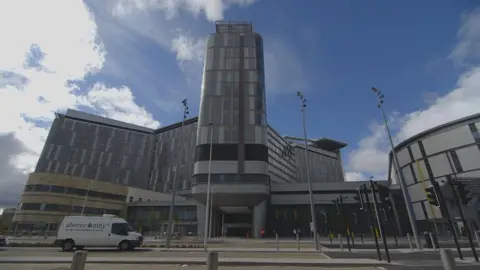Ex-minister calls for hospital pigeon infection inquiry
A former health secretary has called for an inquiry into the deaths of two patients after they contracted an infection caused by pigeon droppings.
Alex Neil's comments came as it emerged the problem at the Queen Elizabeth University Hospital was reported in December.
NHS Greater Glasgow and Clyde said an elderly patient died but from an unrelated cause.
The factors contributing to the other death are still being investigated.
A non-public room, thought to contain machinery, was identified as a likely source.
Mr Neil told BBC Scotland: "I think there has to be an outside inquiry by experts to find why this happened in the first place, secondly how it has been handled by the health board and, thirdly, what precautions need to be taken for the future."
The SNP MSP for Airdrie and Shotts, who was health secretary between 2012 and 2014, said the public will be concerned by the story.
While he acknowledged NHSGGC would not want to cause "panic" Mr Neil questioned why it took three weeks for the news to be made public.
He added: "There are confusing messages coming out of the health board so they need to clarify the situation and do so as a matter of urgency."
Mr Neil also called on NHSGGC to confirm when the patients died and reveal if the airborne infection, which is a Cryptococcus species, was the key or a contributing factor.

Earlier a health board spokesman declined to comment on the timeline of events.
He said: "Our thoughts are with the families at this distressing time.
"Due to patient confidentiality we cannot share further details of the two cases.
"The organism is harmless to the vast majority of people and rarely causes disease in humans."
NHSGGC confirmed a small number of vulnerable paediatric and adult patients are receiving medication to protect them.
Portable HEPA air filter units have been installed in specific areas as an additional precaution.
The Scottish government confirmed officials became aware of the problem last month.
A spokesman said: "Our primary concern, and that of the Health Board, remains the safety and wellbeing of the patients and their families at the hospital.
"There is an on-going review of two isolated cases of an unusual fungal infection within the Queen Elizabeth University Hospital site, which were detected in December 2018.
"Control measures are in place, including the installation of portable HEPA filters in the ward and adjoining areas. There have been no further cases reported."
The government said it has been given assurances by the board that it is committed to delivering the best medical and nursing care in a safe environment.
The spokesman added: "They are keeping patients and their families updated on an on-going basis and will ensure that patients and their families have the opportunity to discuss any remaining concerns with the senior clinical team."
When the story was first reported Teresa Inkster, lead consultant for infection control, said it rarely affected humans.
'Very unusual'
Prof Hugh Pennington, of Aberdeen University, said he was surprised to learn of the infection.
The epidemiologist said: "It is very unusual in the UK.
"It is quite common in other parts of the world, particularly in tropical parts and in the US and in countries like that, where they have more problems with this particular kind of fungus."
Prof Pennington said people with weak immune systems are most at risk.
He added: "When it gets into the blood stream a lot of people have fairly straightforward infections and it settles in the lungs but the big problem with this is that it can cause meningitis and, as we know, meningitis can be a very serious infection."
Prof Pennington said anti-fungal drugs are used to treat the infection but warned it can be fatal if it is not diagnosed.
Airborne infection
The expert said a key priority would have been stopping the airborne infection from entering the hospital's ventilation system.
He added: "Obviously they have stopped the pigeons getting into the machine room.
"It surprises me slightly that there was any there in the first place."
During the investigation, a separate issue arose with the sealant in some of the shower rooms.
NHSGGC said repairs are underway and our maintenance team are working to remedy this issue as quickly as possible with the minimum disruption.
As a further precaution, a specific group of patients are being moved within the hospital due to their clinical diagnosis and ongoing treatment.
The £842m QEUH opened in April 2015 and featured in the BBC series Scotland's Superhospital.
